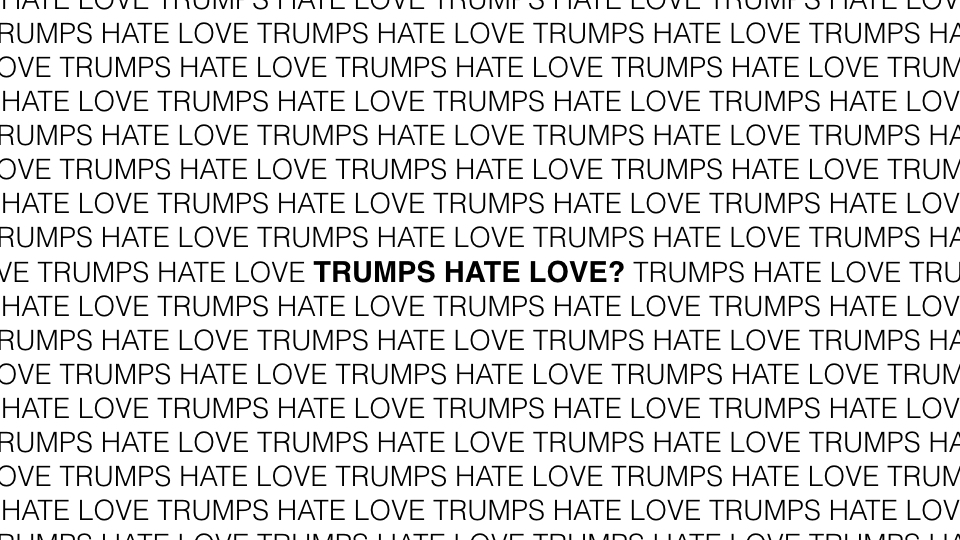Those engaged in activism are continually seeking ways to be more effective with their limited time and resources so as to continue producing maximum desired outcomes. Whether you want education reform, healthcare reform, a political outcome, or to advance environmental initiatives, it’s critical to be as effective as possible.
A common strategy used in activism, politics, or waging war, is to vilify the ‘other’ so as to create a sense of fear and urgency that will mobilized people to join your cause, donate time, or donate money. It helps create unity when people feel they must join together against a common enemy.
In the recent U.S. election, the slogan “Love Trumps Hate” became a popular chant at rallies and protests. This is a play on words referring to Donald Trump. When the phrase is repeated long enough the words begin to blend together to form the statement “Trumps Hate Love.” Those who became immersed in the anti-Trump movement really believed they were in an epic battle between love and hate, so when hate ‘won’ in the end, it was a traumatic experience. It wasn’t just losing an election, it was witnessing what they believed was an eclipse of the sun as a dark empire took over the land.
10 Problems with the ‘Love Conquers Hate’ Message
The recent presidential election shows how vilification of the ‘other’ has diminishing returns. Here are ten problems with using a ‘love conquers hate’ focused message:
- Creates Fear. Building up the ‘other’ as hateful and evil creates fear among your base. Fear is not a good, healthy, or effective place for people to work from. It draws out of people their most base tribalistic defensive fight-or-flight worst behavior. It doesn’t draw out the best in people.
- Discredits Love. In reality, love indeed does conquer hate. However, running a campaign on ‘love’ runs the risk of making love look like a weak and poor choice if the election is lost. Thus many will conclude, well ‘love’ didn’t work, so let’s try something else.
- Dishonest. One risks being perceived as dishonest and a liar if the ‘evil hate-filled’ opponent you’ve described ends up on the Today Show and on ABC News with George Stephanopoulos – along with his family – being seen by millions of viewers as very friendly, cordial and likable. Those who’ve seen extended interviews with Trump and his family will conclude that anyone saying “they are all about hate” is a liar who is hateful.
- Doesn’t Demonstrate Love. Marching isn’t love. Shouting isn’t love. Self righteousness isn’t love. Love is listening, caring, believing the best of others, drawing the best out of others, trying to understand others, engaging in acts of kindness, helping others, forgiving, cooperating, seeking mutually beneficial compromises, and agreeing to disagree. Standing up for love doesn’t need to be confrontational or negative.
- Doesn’t Work. In addition to the other 9 reasons shown on this list, the bottom line is that an ‘us-against-them’ or ‘love-versus-hate’ message ultimately fails, as we saw in the 2016 election.
- Illegal. When the efforts to vilify someone in the public media encroach on the truth, then they become slander and defamation – which are illegal acts designed to harm someone. To the extent rallies and protests involve trespassing, damaging property, taunting, bullying, and physically harming others they are illegal. It’s more effective to work within the realm of what’s legal and honest. Acts of property damage and violence are examples where hate has trumped love rather than the other way around.
- Problem Focused. A battle against hate and evil doesn’t focus on meaningful solutions – only on what you’re against. It’s a fault finding and problem-centric outlook rather than promoting positive thinking and seeking common ground with others. It’s divisive.
- Risks Hypocrisy. When presuming to be on the side of ‘love’ one runs the risk of being as hateful and angry as the imaginary straw man opponent you’ve built-up, thus being shown as a hypocrite.
- Wasteful. One wastes valuable time, resources, and community building potential when building up an ‘enemy’ as being the epitome of hatred and evil. In the end, when the house of cards inevitably falls, there’s nothing constructive you can build on. It steals people of their hope, and leaves them with only fear and disappointment.
- Wrong. It’s simply wrong to demonize, vilify, and shame others. It’s a form of irrational bigotry that creates a premise (the ‘other’ is evil) and then assembles all available data to prove that premise, while ignoring anything that challenges the premise. This emboldens and promotes the very same thought process that’s the foundation of racism, bigotry, sexism, xenophobia, and fear of LGBTQ people.
